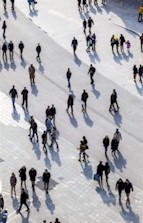
The modern media have brought about a tectonic shift in our sense of our position in the world relative to those whose names and likenesses have increasingly come to dominate our consciousness.
We’ve evolved into a society where everything important appears to take place on the other side of a screen. We tend to perceive this realm as a magical, even mythical place—in a sense, our modern-day Olympus—and we accord commensurate status to the beings we perceive as inhabiting it.
While all ages have had their famous people, the rise of television enabled modern celebrities' presence to be felt in a much more gripping and experiential way. Instead of just being names sometimes printed in accounts of a world that was obviously far removed from the direct and tangible reality of our everyday existence, celebrities' moving (and speaking) images have become an inescapable part of our lives.
The more tangible the presence of celebrities has come to feel to us, the less significant the real people around us have begun to seem. And since we ourselves don’t appear as glowing images on a screen, how important could we ourselves be? We can easily come to believe that our natural role in the order of things is nothing more than to watch our betters from the darkness of our own obscurity.
The net effect of this media-centrism has been to establish a psychological equivalent of the old feudal order, with a “celebritocracy” occupying the upper reaches of society in the manner of the old aristocrats, and all the rest of us relegated to the status of inconsequential serfs.



